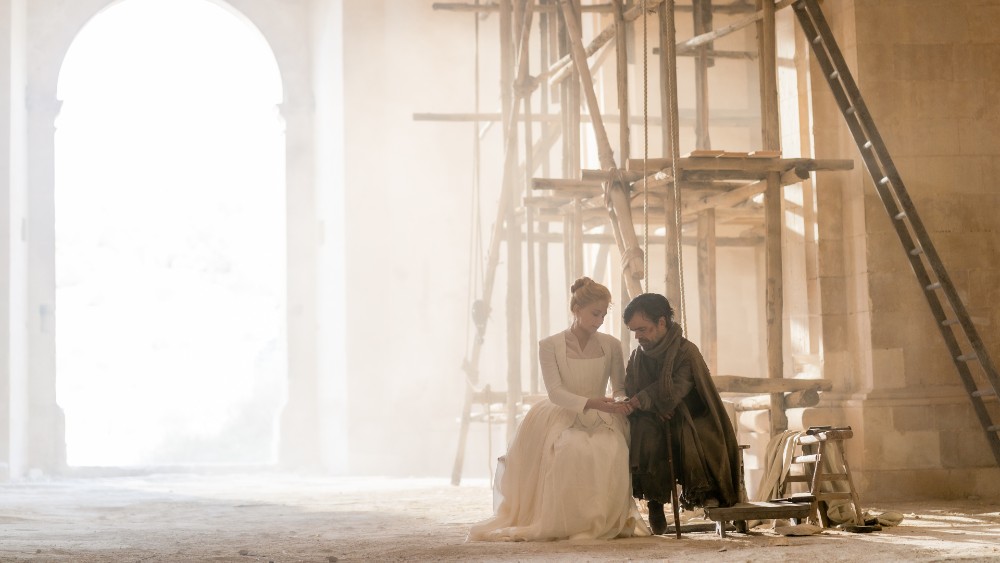
If you’re a fan of the perennial rock band The National and have had a chance to see them live, it’s impossible not to miss the striking image of the two twin brothers, Aaron and Bryce Dessner, on either side of the stage playing guitars so in-sync with each other it just creates so much of the sound for which the band’s renowned. (Not to take anything away from the three other members of the band, of course.)
In the past few years, the Dessner Brothers have been working on more film scores, to the point where they actually have three soundtracks over the last few months of 2021. Cyrano might be the most personal project for the Dessners since it’s a musical movie, directed by Joe Wright (Atonement, Anna Karenina), which stars Peter Dinklage as the famed literary character, who pines for the beautiful Roxanne (played by Haley Bennett) who has her own eye on the handsome young Christian (Kelvin Harrison Jr.). The reason this project is a little more than a typical scoring project is that the brothers wrote all the music for a stage musical, which was adapted for the screen, and they worked closely with the actors to help them get ready to sing live as cameras rolled.
Mike Mills’ C’mon C’mon is almost just as personal, only because the brothers had fairly recently made an album called “I Am Easy to Find,” on which Mills helped as an adviser and producer, of sorts. (You can read more about that here.)
The third project is Clint Bentley’s Jockey, a smaller indie starring Clifton Collins Jr. as a jockey close to retiring when a younger jockey shows up claiming to be his illegitimate son.
All three movies are so very different, but what the Dessners bring to each of them musically just adds so much to the tone and the emotions, which makes all three movies so wonderfully watchable.
Below the Line had a chance to speak with the Dessners a few weeks ago, but coincidentally, we had met earlier after they did a press conference with Joe Wright and the cast of the movie in New York City.
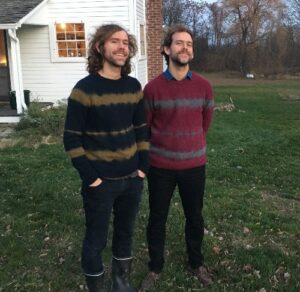
Below the Line: I think the first time I heard The National’s music used in a movie, other than just a song or two, was Marshall Curry’s Racing Dreams, because he had some instrumental tracks that he was able to use for that doc. I don’t know how much you were involved besides sending the instrumentals to him.
Aaron Dessner: Yeah, with him, he would just ask us for stuff and be like, “Here’s a folder,” but he’s always been a great friend of the band, so whenever he asked, we’re just like, “Yeah, what do you need?”
BTL: How long did you decide to start scoring, specifically. Besides Cyrano, scoring other movies. Were you always talking to filmmakers and involved in that realm?
Bryce Dessner: I think for years, actually, we were so busy with our band, that we were just focused on that. We used to have a lot of music, songs in films. We get asked to put songs in films. I remember Tom McCarthy, when he made Win Win, he asked us to write a song for that film, which we did, and we ended up kind of scoring the last scene of that film as well. It was probably in 2014, around then that I got asked by Alejandro Iñárritu to work on The Revenant with Ryuchi Sakamoto, and that was probably the big shift, as far as getting more interested in film music, and also just even the idea that we could do that. And then, from there, we started doing some projects collaboratively, or sometimes I do them on my own.
BTL: Cyrano is an interesting case, because you did write it for the stage, but I know Joe Wright got involved fairly early, as far as adapting it into a movie, almost at the same time. I assume you had everything written, and you had demos sung by Matt (Berninger) and Carin (Besser) before Peter Dinklage and other actors were cast? How long did it take to write the musical before you had something ready to go on stage?
Aaron: The interesting thing was that Erica Schmidt, when she was adapting Cyrano — she wrote the screenplay — and she originally wrote an adaptation for theater. She was hoping, dreaming of The National, I guess, because she loved our music, and she was sort of imagining our music as this heartbeat that would run throughout the play, and approached about collaborating on a musical. We were a little dubious at first, but the more we got to know her, and saw what she wanted to do, it just became this weird, very inspiring opportunity. And also for Matt and Karin to write lyrics that were in service of a narrative. It was an iterative process, because there were two different off-Broadway, off-off-Broadway, theatrical proof of concept runs, where we could really test ideas, and there were a lot more songs. There’s at least 10 or 12 other songs we wrote that aren’t in the film.
But Matt would always sing them first, and later even, we would sing them sometimes, as we tried to write and rewrite them into and [try to] find exactly how they should be arranged for the film. A lot of things changed as Joe ramped up towards shooting the film, because he kind of focused in on certain songs, and there are some songs that didn’t exist yet that he wanted us to write and a lot of changes to be made. Also, just figuring out exactly how they should sound and be arranged and be produced. Bryce was on set in Noto, Sicily, and even tweaked writing things in the moment, the day before they would shoot some things. But I think we had the benefit of a lot of time to work towards it.
BTL: I heard earlier about the studio you built in Noto. When Joe told me that it was shot during COVID, I didn’t presume that the film’s composers or other musicians would even be allowed to go on set, but I guess this was a very unique and special situation.
Bryce: It was a real gift in a way. We don’t normally get to go to set. I think composers are obviously important, but it’s not in that part of the process — it’s usually after. In this case, it was so important to the whole experience, and the way they were going to shoot the film was important that he could hear the music. Just like he was so specific in the visual design, he really needed to hear, and the music was informing that as well. The ability to really let the actors own the songs? We’d written these songs, we had demos, we’d work with each of them in the studio, but to really like on-set, get them to define their voice and to shape the songs. And even in cases, we were still rewriting them and changing register or sometimes even lyrics based on the feedback we were getting. So, that was really important I think for the eventual experience of them singing live. They needed this background for the rehearsals.
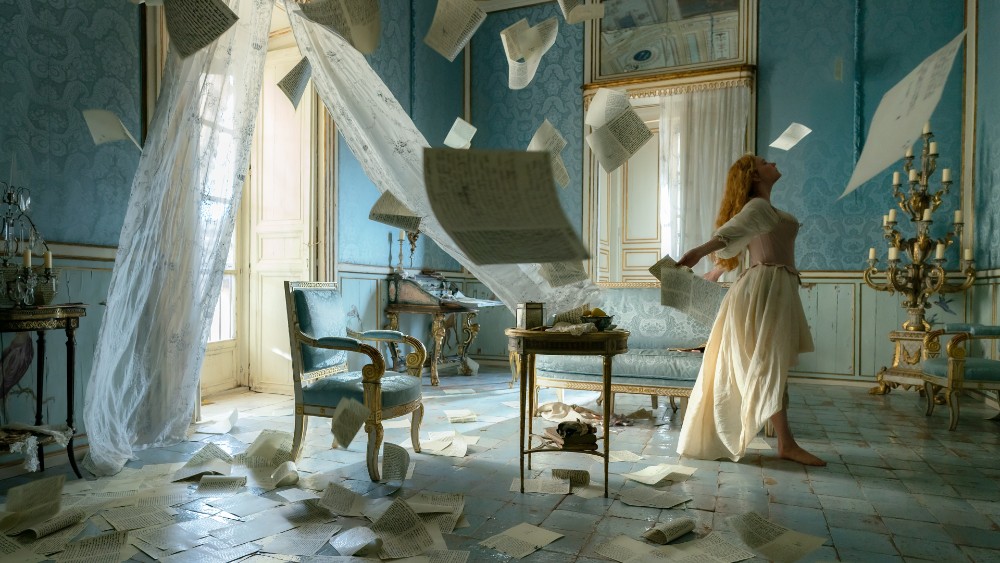
BTL: You mentioned having 10 or 12 songs that you didn’t use for the musical, so were some of those things you could repurpose or revisit when Joe was making the movie? Did you have songs you could play him?
Bryce: We wrote probably six or seven new ones for the film, really only a couple of which are in the film, and then others we didn’t use. And then, there were other songs written for the theater that either weren’t used for the theater or for the film or both, so there’s a lot of music. There’s probably a double album of Cyrano songs.
BTL: Cyrano II. I don’t even know what that would be.
Bryce: Maybe [about] Christian.
BTL: That’s right, a spin-off about Christian. I didn’t get to see the original stage musical when it played in Brooklyn, so what was the instrumentation? Did they have a live band of some kind for the live show?
Aaron: It was a small five-piece band, so it was drums, violin, cello, guitar and piano.
Bryce: Yeah, there was a clarinet.
Aaron: So there was seven? And it was beautiful. I think the challenge was a lot of these songs are based around how we play, specifically, and we tend to be kind of — especially when we play guitar — we play a lot of finger style intricate sort of interwoven, like twin guitar playing, mirroring stuff that we do with each other. They did a great job in the theater, but it was fun with the film to be able to really perfect it and sort of really dial in the arrangements.
BTL: I was listening to a few of your scores and there were winds and strings, and I seem to vaguely remember The National having winds and string players live, at least when I first saw the band. I don’t know if that’s changed since then.
Bryce: We’ve always had — I think since Boxer, or even Alligator — we’ve had a prominent place for orchestration in The National songs. Cyrano is a bit different, where the strings or some of the orchestration are primary, where they’re really driving the songs. Definitely the strings and piano. We enjoyed this sort of creative choice in this film, partly based on where it was shot, and the fact that it is a period film, it made more sense to… there are guitars as well, and some electronics and even synthesizers at times. This has sort of modern Baroque sound, but definitely creating an orchestral score that’s really driving the songs was something we haven’t necessarily done exactly on a National album in that way.
BTL: I’m glad you mentioned synthesizers, and I was curious whether MIDI and computers is part of your writing or recording process, at least before you get in the real instruments to record. Do you use computer software/sounds to build up the songs first?
Aaron: Bryce scores and writes a lot of… he’s a classical composer and notates a lot of stuff and then is rendered in MIDI with samples, so we can hear it. But we still use a lot of real instruments, I would say, when we’re writing songs. We didn’t grow up using Logic or samples, stuff like that. Now, we use them as like production techniques, but I think we still kind of veer towards trying to write something that you can play with one or two instruments, and it’s compelling, at least when you’re writing a song.
BTL: Bryce mentioned earlier that you play piano, Aaron, so do you play some sort of keyboards as well? Do both of you play other instruments besides guitar?
Bryce: We both play piano. I would say Aaron’s a better pianist, I’m more of a guitarist, like classical guitar and that was my background, but Aaron plays drums. I play flute. We kind of can get our hands on a lot of things
Aaron: I like the bass.
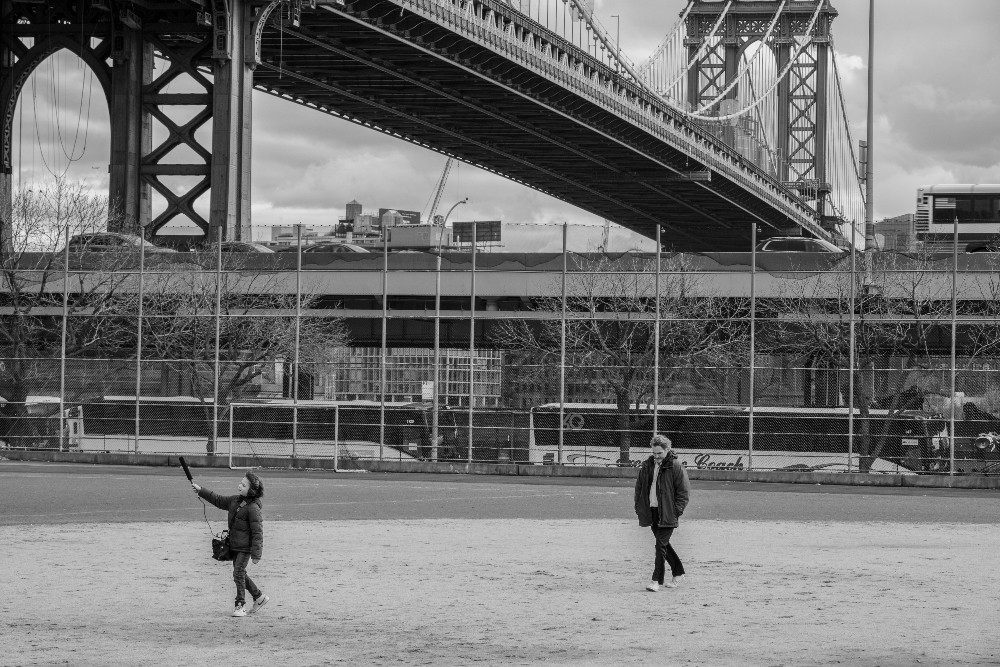
BTL: Especially with C’mon, C’mon, there were a lot of winds, and I wondered if you’re recording any of that stuff yourselves. I’m also not sure what the timing was between C’mon, C’mon and Cyrano. I’m not sure how much of that you had done before starting Cyrano.
Aaron: They were a little bit simultaneously, because I think C’mon C’mon was a very long process, because we generally were sort of searching for the sound for a long time with Mike, and he was elusive, because until he was finished editing, until he really locked his picture, there was an unknown quality that he was searching for. Musically, I think he wanted it to be experimental and somewhat impressionistic, where you can read it in different ways. It’s not like super, “This is a sad moment where the child is saying something dark.” He didn’t want to color that dark, he wanted to color it neutral. And so, we were searching for ways to do that with him. But meanwhile, Cyrano, because it started years ago, but it really ramped up last summer, and we had to kind of race to get the songs ready for the shoot. And then Bryce was on set, and then when the movie had been shot, and we were actually scoring it, it was a very heavy lift, because ultimately, it became this baroque modern orchestral score. Bryce did a huge amount of orchestration for it, but even while you were doing that, we were still doing C’mon C’mon with Mike. It was kind of like they were happening simultaneously, which was really fun, because they’re just radically different.
Bryce: Yeah, the woodwind stuff on C’mon C’mon… all the kind of synthesizers and electronic sounds, we played, but the woodwind stuff was written. There’s flute and clarinet, and there’s these two great players, Hideaki Aomori and Alex Sofler, really, really excellent musicians who recorded that stuff for the C’mon, C’mon score. We’re not good enough to play that.
BTL: Do you guys have your own joint studio or are you working separately and sending files back and forth?
Aaron: We have my studio in upstate called Long Pond in the Hudson Valley, and Bryce has a home studio in France, and then we’re hopefully going to build a version of Long Pond but in France near the Basque part of France.
Bryce: I live in France. My wife is French. We have a four-year-old boy, and so we’re there and Aaron’s in upstate New York. So we have to kind of figure that out in terms of our transatlantic collaboration.
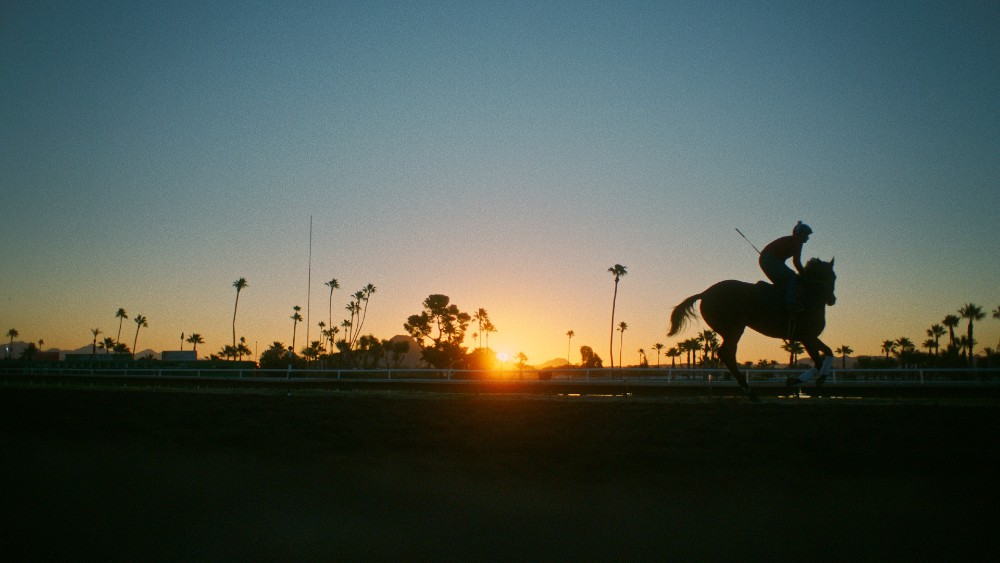
BTL:I feel like musicians and composers were well-prepared for COVID, since so many are working in their own home studios, and you can really do as much at home and more than you could do even 10 years ago. Would love to talk more about working with Mike, so did he have a picture that you could compose to, and was the case with Jockey? Did you get involved later on after they were already editing the movie together? Or were you also involved fairly early on with that one?
Bryce: [For] Jockey, Greg Kwedar and Clint Bentley, who created that beautiful film, are friends, and we worked on their previous film Transpecos. Jockey, compared to Cyrano… Cyrano is a medium-biggish movie, C’mon was a smaller movie, and Jockey is an even smaller, they were just doing everything they could to make it work on their budget, and we’d love them, and it’s a beautiful script. That one, we got it finished. We had read the script, and were kind of involved in hearing about it, but they sent us essentially a finished cut. So it’s really scored very specifically to picture. In a way, they really responded to certain ideas quickly with that one, so it was kind of, in a way, a very effortless collaboration where there’s certain electronic sounds and then the strings that were used, it really just kind of clicked with that film. It’s a beautiful, beautiful film and performance.
BTL: Did they actually do a screening of it at Sundance or was it just virtual? I can’t remember because I didn’t go.
Bryce: It was screened at Sundance. I wasn’t there. I’m not actually sure if it was with a live audience or not. I know that the film did really well there and won some awards, and yeah, it was great for them.
BTL: As far as working with Mike Mills, you had the previous musical collaboration with the album and long-form video. Are you able to come up with musical ideas just from knowing the script and give him ideas or music that he can use while editing?
Aaron: Yeah, we did. Mike knows us really well, because we collaborated with him with The National, with I Am Easy to Find, and we love his films, and he’s kind of become this weird mentor. He’s definitely somebody that we feel close to artistically and personally. So yeah, we would make stuff. We filled folders for him of ideas, almost none of which initially are actually in the movie, but we made a lot of great music, I think because of that. He really enjoys listening, and he gives a lot of feedback, and he’s a real muso with just a deep knowledge of music. It’s also just fun to bounce things around with him because he’s like, “Oh, what about this recording of this?” There’s certain Brian Eno sounds where he’s like, “How do you think he did that?” I’m like, “I don’t know. Let’s see.” It’s kind of a fun scavenger hunt.
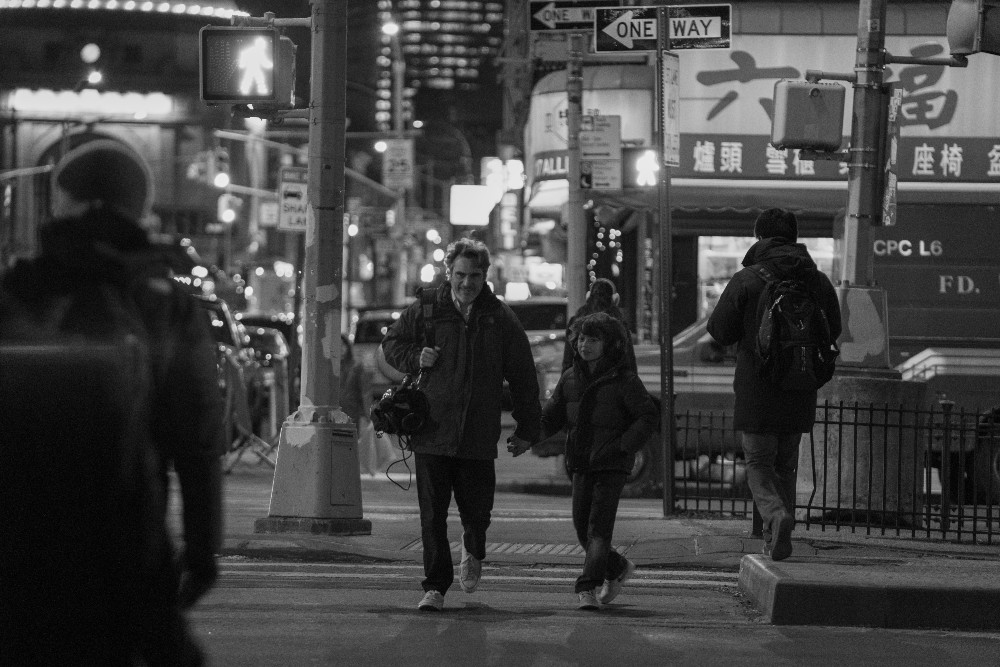
BTL: It was really fun talking to him and learning about the collaboration on the album, and I learned about how he was there at the studio while you were making it. I want to ask about mixing either Cyrano or C’mon C’mon. I assume you’re very involved with that. Were you able to get into a studio and do the mix either with Joe or Mike as well or was it still done separately?
Aaron: They were done remotely. So Cyrano was mixed at Abbey Road. Well, actually, they mixed it at…
Bryce: It was recorded at Abbey Road by Peter Cobbin and Kirsty Whalley, who are these legendary English sort of genius sound mixers engineers, but then they have a studio in London where they mix a lot of films. But we were really involved with that process of back and forth. You mix the music how you want to hear it, and then, there’s the sound, stage mix, the film mix, so they take stems, and there’s a whole other process that goes on.
Aaron: And then with Mike, I think we did mix it to some extent, actually at Long Pond, the music, but then we gave them stems, and when they mixed the film — they mixed it in LA — then he would ask us almost daily, like, “Can you guys add a low frequency here or a something new here?” Once they could hear it on a soundstage and really know how they wanted to finish it… because it’s more experimental, that score. So we did add a lot of sub-bass and things like that to it.
BTL: I think you mentioned earlier that you recorded some stuff in Italy, which ended up on the soundtrack, which obviously was not sung live for the filming, so is there a lot of overlap between what’s on the soundtrack record vs. what’s in the film or are they completely separate animals?
Bryce: No, they’re deeply related, I would say. The soundtracks in a way are kind of closer to our intention. They’re kind of versions that we finished, thinking about the soundtrack. And those are the elements that went into the film, as well, but then there’s the kind of ins and outs of the film mix can get shifted a little bit, based on as they’re in there finishing the movie. The nice thing for Cyrano, the film was shot to the music really. There’s the screenplay, and there’s the music, and those things kind of defined how the images were shot, so it’s pretty much what we wrote.
Cyrano is opening in L.A. today, Friday, Dec. 17, but only for one week for Oscar consideration. Its actual release will be on Friday, Jan. 21. C’mon C’mon may still be playing in a theater in select cities, while Jockey will open in New York and L.A. on Weds. Jan 29. You can read J. Don Birnam’s review here, and look out for our interview with director Joe Wright probably in January.
As luck would have it, we’ll also have an interview with Jockey director, Clint Bentley, fairly soon. The soundtracks for Cyrano and C’mon C’mon are available to buy on CD and maybe vinyl, as well as being available on all good streaming services.





